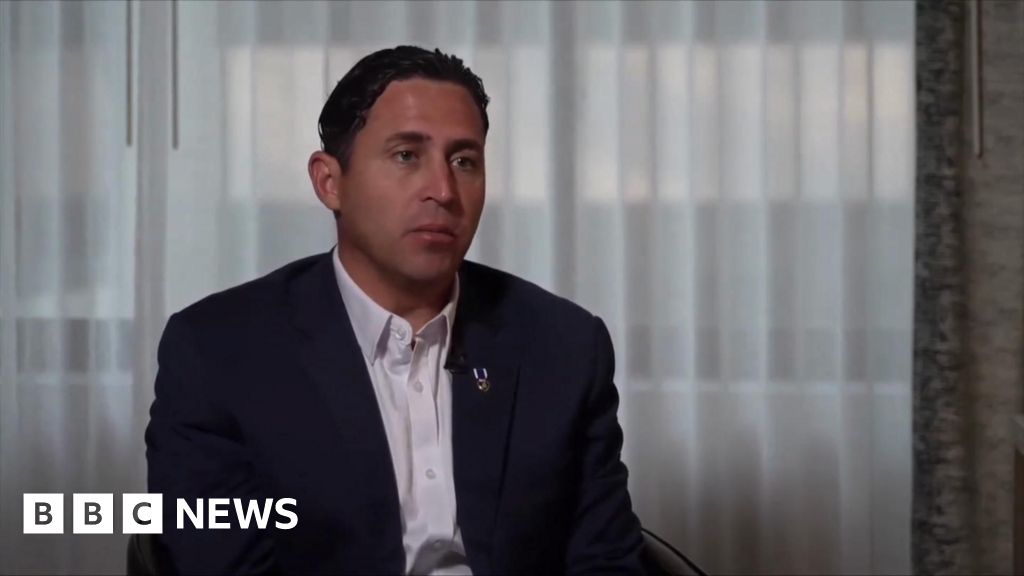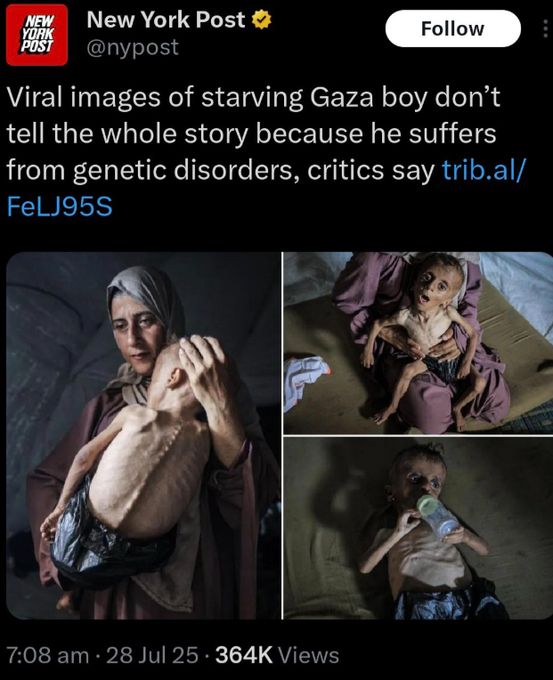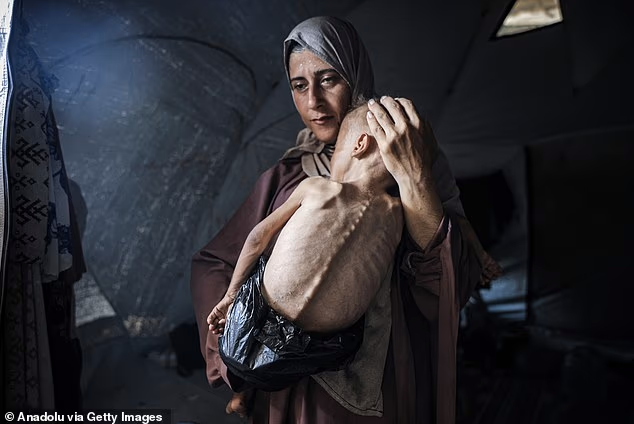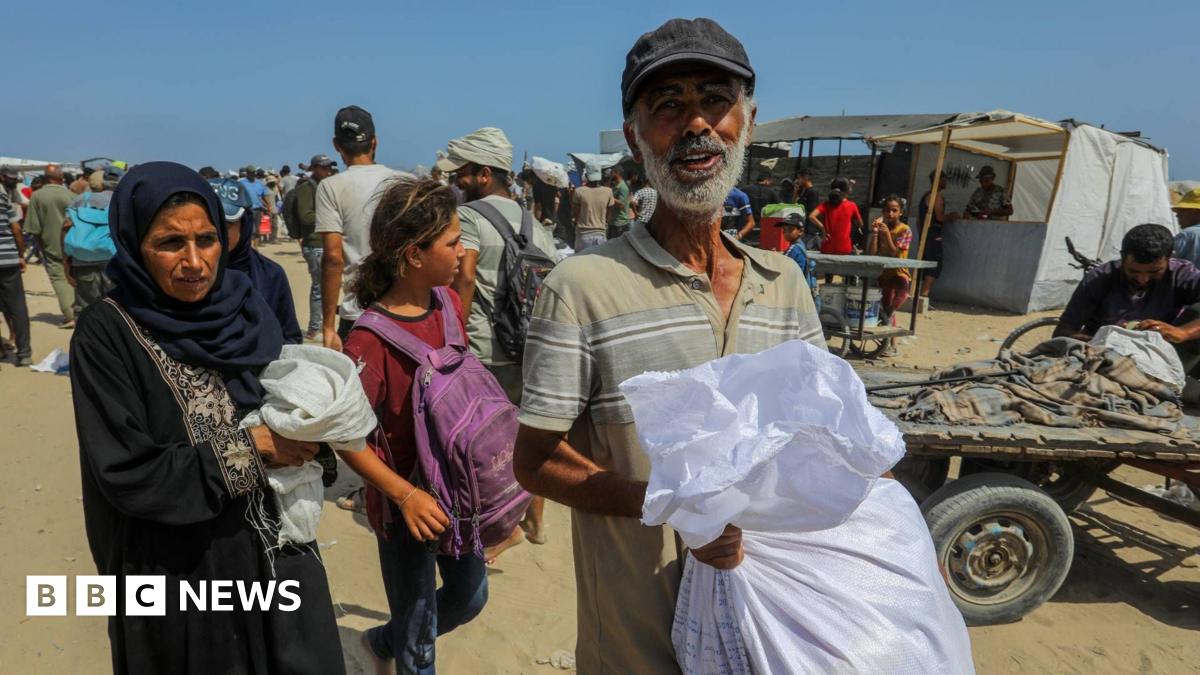It'll be very peaceful when he's done. Corpses are remarkably nonviolent.
You are using an out of date browser. It may not display this or other websites correctly.
You should upgrade or use an alternative browser.
You should upgrade or use an alternative browser.
Israeli-Palestinian Conflict
- Thread starter Teufel
- Start date

Gaza aid contractor tells BBC he saw colleagues fire on hungry Palestinians
The Israel- and US-backed Gaza Humanitarian Foundation has strongly denied the allegation.
Despicable.

 www.bbc.com
www.bbc.com

Gaza: 'I witnessed war crimes,' former worker at GHF aid site tells BBC
A retired US soldier reveals why he quit working at Israel and US-backed Gaza Humanitarian Foundation aid hubs.
Totally not a genocide though.
Prem Thakker ツ (@premthakker.bsky.social)
Read this very carefully: *One quarter* of all the people who have died of starvation in Gaza over the past 22 months have died in the past *3* days.

Trump Thinks He At Least Deserves A 'Thank You' For Sending Money To Starving Gaza
"Nobody talks about it, and it makes you feel a little bad," the president said of sending aid to Gaza, where Palestinians have been starving to death.

Israeli rights groups accuse Israel of genocide in Gaza
Israel's government rejects the allegations in the separate reports by B'Tselem and Physicians for Human Rights-Israel.
"Two leading Israeli rights organisations have said Israel's conduct in the war in Gaza constitutes genocide against the Palestinian population.
B'Tselem and Physicians for Human Rights-Israel released separate reports on Monday based on studies of the past 21 months of conflict.
The organisations, which have been active in Israel for decades, said in a joint statement that "in these dark times it is especially important to call things by their name", while "calling on this crime to stop immediately".
An Israeli government spokesman said it strongly rejected the accusations of genocide, which are the first to be made by human rights groups based in Israel..."
It is nearly impossible to know what is actually happening in Gaza, and it doesn't help that so many of the loudest voices on this issue have long since burned their credibility. Here is a good attempt - and suggestions - from someone who has been right in the past:

 www.thefp.com
www.thefp.com

Matti Friedman: Is Gaza Starving? Searching for the Truth in an Information War.
When I asked a former senior government official if there is mass hunger among Gazans, he answered me honestly: ‘I don’t know.’
JERUSALEM, JULY 27 2025 — A few weeks into the Gaza war that began on October 7, 2023, we Israelis learned from every major press outlet in the West that we’d just bombed a hospital and killed hundreds of people. The devastated Al-Ahli hospital was on front pages around the world, with a New York Times headline reporting “at least 500 dead.” Furious protests erupted, and a mob burned a synagogue in Tunisia.
The story was fake. A misfired Palestinian rocket had landed near the hospital, which was intact.
Around the same time, we started reading that Israel’s response to the October 7 terror attack—a war that Palestinians started, and which had barely begun at the time—was actually a “genocide,” an ideological slur thrown at Israel by Soviet propagandists, Arab dictators, and the Western left beginning in the 1970s. In the following months, hundreds of Israeli soldiers were killed fighting house-to-house in areas where Palestinian civilians—and combatants—were warned that troops were coming so they could leave.
Reports of impending hunger engineered by Israel in Gaza have been commonplace not just since the beginning of this war but for at least a decade and a half, since Hamas seized the territory and Israel and Egypt imposed a blockade that supposedly turned Gaza into an “open-air prison.” The famine never materialized. Now we hear claims that this same period of supposedly extreme deprivation was actually a Gazan idyll that Israel has cruelly destroyed in this war.
Very little of what is reported here, in other words, is what it seems. This is nothing new. Over the years, Israelis have been accused of fake massacres and rapes. The country’s actions are lied about almost daily by people describing themselves as journalists, analysts, and representatives of the United Nations, often using statistics that are themselves untrue.
For people here in Israel, the constant barrage of libel—like the more literal barrages of rockets—is simply a fact of life. After years of this, average Israelis do what people do when confronted with lunatics on the New York subway: They tune it out.
The transformation of truth-telling institutions into ideological megaphones has had a high price for citizens in liberal societies and for the institutions themselves, as we’re now seeing at places like Harvard and NPR. The feeling of being unmoored from objective reality—of rowing a boat through a choppy sea of lies and propaganda—is very much a feature of the present moment, and not only in Israel. But one of the most awful prices was made clear this past week, with reports of acute hunger in Gaza.
In a blizzard of ideological fiction, how are sane citizens in Israel, or anywhere else, supposed to know what’s true and to do the right thing? It’s not an exaggeration to say, as we’re seeing right now, that the answer to this question can be a matter of life and death.

In an attempt to understand the truth of the reports, I called several trusted colleagues, veteran Israeli journalists intimately involved in covering events here and concerned both with the health of our society and that of innocent Palestinians. It was clear in speaking to them that our plight as journalists is only marginally better than that of the average citizen.
The consensus was that there were nearly no trustworthy sources regarding reality in Gaza—certainly not the “Gaza Health Ministry,” which answers to Hamas; or Palestinian reporters intimidated by Hamas; or the international organizations, like the UN refugee agency UNRWA, embroiled in various forms of collaboration with Hamas. All of the above are engaged in a successful information campaign that uses Palestinian suffering, real and imagined, to catalyze international anger and tie Israel’s hands.
The international press isn’t the answer. During my years as a reporter and editor for the Associated Press, I saw coverage altered by Hamas threats to our staff, while this fact was concealed from readers. I know firsthand that nearly no information coming from Gaza can be taken at face value.
But neither can we Israelis trust our own government, which has regularly misled the public about the war’s progress (Netanyahu assured Israelis over a year ago that we were “a step away” from victory); about the shifting goals of the campaign; about the success of various operations, which have seen soldiers repeatedly return to areas that have already been cleared at great cost; and about the priority assigned to the release of hostages, many of whom were released in prisoner swaps only because of American pressure and 50 of whom remain, alive and dead, in Hamas hands.
And we can’t trust much of the information from the army, which regularly spins information overtly or by omission. (The army released a video last week showing Hamas members eating plentiful food in a tunnel, for example; Amos Harel, military reporter for the Israeli daily Haaretz, wrote Friday that the clip is a year old and that some of the fighters are now dead.)
When I asked a friend—until recently a senior government official, with connections at the highest levels here and abroad—if people are starving in Gaza, he answered honestly, “I don’t know.”
For a would-be observer of reality, someone who believes that truth can be grasped and transmitted to others, the replacement for institutional trust seems to be a turn to individual people with a track record of getting it right. For example, when David Horovitz of The Times of Israel wrote an alarming article on the subject on July 23, it was a clear indication that it would be unwise to dismiss the reports as just more propaganda.
The hunger in Gaza managed to belatedly penetrate the consciousness of the Israeli mainstream last week, in large part thanks to individual journalists who command public trust and who speak regularly to Palestinians they know. One such journalist is Ohad Hemo, the Palestinian affairs reporter for Channel 12 News, the country’s most widely watched news program, whose report last Wednesday was shared widely. Food warehouses serving Hamas fighters are still full, he reported, and the crisis wasn’t only Israel’s fault. However, he continued, “I don’t know if people are dying directly from hunger, as is being claimed in Gaza, but there is hunger in Gaza, and we need to state this loud and clear.” Even when aid makes it in, he explained, it’s only fit young men who have any shot at fighting for the sacks and crates beside the trucks and food centers. The aid isn’t reaching many who need it. He’s spoken to people, he said, who hadn’t eaten in days.
PART 2:
You might have thought that hunger in Gaza would work against Hamas, forcing the group to have mercy on its own civilians and accept the ceasefire desired by Israel and the U.S. and currently under discussion in Qatar. But Hamas knows that the opposite is true.
The same reality was described by sources with whom I spoke late last week. One told me that hospitals had cut meals from three a day to one. Even a senior figure in the Israeli military told one of my colleagues at the end of last week that while there isn’t mass starvation as claimed by pro-Hamas propaganda, Gaza really is on the brink this time.
This explains why Israel, in panic mode, began air-dropping aid this weekend, along with Jordan and the United Arab Emirates, and has declared “humanitarian pauses” to let food reach civilians—essentially unilateral ceasefires without any reciprocation from Hamas. There are now indications that food prices are dropping and that some of the scarcity is being addressed, but the situation for many civilians remains dire.
Israel says Hamas bears the responsibility, as the group has diverted aid both to hoard for its fighters and to sell to finance the war—and then cynically uses Palestinian suffering as a propaganda tool. But internationally, nearly all the blame has been directed at Israel, with the implicit or explicit explanation being malevolence or genocidal intent. Israel has periodically tried to exert pressure on Hamas by blocking aid, and earlier this year began trying to conclusively break Hamas’s control of food by providing it through a new organization, American-run and Israeli-affiliated, called the Gaza Humanitarian Foundation.
Because the GHF is an acute threat to its power, Hamas has been doing what it can to foment unrest around its distribution sites, kill its workers, and intimidate people accepting its food. The Americans running the sites have reported the distribution of more than 90 million meals directly to Gazans.
But on the ground, the word directly—according to friends of mine serving with reserve army units close to GHF operations—has often meant chaotic scenes of thousands of men descending on the distribution sites and picking them clean, coming into dangerous and sometimes fatal contact with Israeli soldiers who are understandably scared of disguised Hamas fighters and unprepared for the kind of mass chaos they’re expected to control.
It’s impossible to know how many Palestinians have been killed in these incidents, because Hamas numbers are part of the group’s information war. But my friends serving nearby told me that there have been fatalities in multiple incidents, and that poor Israeli planning is partly to blame. One friend, a committed and capable officer, told me despondently that the distribution effort “isn’t working and can’t work.” It’s not that they’re not trying. The army simply doesn’t have the ability to run orderly food distribution in a hostile and war-ravaged territory that has devolved, to a large extent, into the rule of gangs and clans.
An experienced Israeli civilian involved in the aid efforts, from an organization that works both with international aid groups and the Israeli military, said on Friday that mass starvation is not yet the reality but could be in the near future. There are already “pockets” of malnutrition and real hunger, he told me. The only way to avert a deterioration, he said, is for Israel to abandon the mistaken idea that withholding aid weakens Hamas, and to urgently flood Gaza with food. It’s the right move morally, he said, but also strategically, because the humanitarian crisis is devastating what’s left of Israel’s international support. He praised efforts by the United Arab Emirates and American-led groups like the World Food Program. Israel needs to work with them, he said, rethink its own policy, and move fast before things go from bad to worse.
This is already happening. In the meantime, news consumers worldwide were galvanized over the weekend by disturbing photos like those of the Gazan child Muhammad al-Matouq, who appeared on the front page of Britain’s Daily Express and then on that of The New York Times and elsewhere as the symbol of Israel’s cruel starvation of innocents. After the photographs were seen around the world it became clear that the child in fact suffers from cerebral palsy and other conditions unrelated to starvation. The suffering child ended up being less the intended symbol of Israeli evil than of how genuine misery can be put to use by practitioners of narrative war.

You might have thought that hunger in Gaza would work against Hamas, forcing the group to have mercy on its own civilians and accept the ceasefire desired by Israel and the U.S. and currently under discussion in Qatar. But Hamas knows that the opposite is true: The disaster they’ve engineered in Gaza fuels the global campaign against Israel. That’s presumably why the crescendo of hunger stories coincided on Friday with reports that Hamas has now hardened its positions in the talks, leading to their suspension. (One of Hamas’s top demands, according to an American official cited by The Wall Street Journal, is shutting down the Gaza Humanitarian Foundation.)
One of the terrible facts of this war is that the Palestinians who started the war, and who constructed the twisted battlefield on which it has been fought, won’t act to save their own people. Starvation and death serve the Hamas plan. That means that Israel must decide how far it wants to push—and when to stop.

The Serfs (youtube.com/theserfstv) (@theserfstv.bsky.social)
"It isn't genocide because he has a disability" may be one of the most evil things I've ever seen anyone publish in human history
They're literally confiscating baby formula from doctors at checkpoints, something a UK surgeon treating babies in Gaza confirmed. Meanwhile, babies are dying because there’s no milk. That's not just negligence, it's policy.

The Serfs (youtube.com/theserfstv) (@theserfstv.bsky.social)
"It isn't genocide because he has a disability" may be one of the most evil things I've ever seen anyone publish in human historybsky.app
Uh yeah it kind of does matter if he has multiple pre-existing genetic disorders and his toddler brother right next to him looks fine.
And it happened again:

The photo of the toddler who became a symbol of hunger in Gaza: Investigation shows he suffers from genetic disease
Photos of Muhammad al-Matouq, the emaciated Gazan toddler photographed wearing a diaper made from a garbage bag, were published in nearly every media outlet covering the crisis in the Strip; But an independent journalist finds that he suffers from a background of genetic diseases, including...
In another example of global media involvement, the Italian newspaper Il Fatto Quotidiano published a front-page photo [July 24th] of a malnourished child under the headline “Is This a Child?”—a direct reference to Primo Levi’s Holocaust memoir "If This Is a Man" (Later retitled "Survival in Auschwitz").The article included an interview with Francesca Albanese, the UN’s special rapporteur on the Palestinian territories, who accused the Italian government of complicity in Israel’s alleged “starvation policy.” However, further investigation revealed the child in the image, Osama al-Raqab, suffers from cystic fibrosis. The photo was taken in April, and he has been in Italy since June 11, thanks to humanitarian and diplomatic efforts by the Italian government that also brought several other ill children out of Gaza. The following day, Il Fatto Quotidiano doubled down with a follow-up article by student reporter Aya Ashour, recently relocated from Gaza to Italy, who claimed to have interviewed the boy’s mother. She alleged the child was “suffering terribly” and was being treated at Nasser Hospital in Khan Younis—even though he has been in Italy for over a month.
Hey, did you hear an old lady is suing McDonald's for hot coffee?
Last edited:
We have all these cameras and a nearly limitless flow of information yet somehow the fog of war seems like it's only gotten foggier.
That's because information is a recognized and heavily weaponized war front.
We have all these guns and bombs and tanks yet somehow the horrors of war seem like they've only gotten more horrific.We have all these cameras and a nearly limitless flow of information yet somehow the fog of war seems like it's only gotten foggier.
Yes, it's rather difficult to report on war crimes being committed by Israeli (and possibly American) forces as they've blocked most access to the area.
Funny that.
Anyway, some possibly good news, however small it might be to some:

 www.bbc.com
www.bbc.com
And it's pretty obvious that famine/starvation is a thing in Gaza:

 www.bbc.com
www.bbc.com
There's no denying it.
Funny that.
Anyway, some possibly good news, however small it might be to some:

Seven more malnutrition deaths reported in Gaza, as Hamas-run health ministry says 104 killed in 24 hours
The death toll since the start of Israel's military campaign in Gaza has risen to 60,138, the ministry says.
- Keir Starmer says the UK will recognise a Palestinian state at a UN meeting in September unless Israel meets certain conditions.
- He says the plan will go ahead unless the Israeli government takes "substantive steps to end the appalling situation in Gaza", including a ceasefire - here's what else the prime minister urged Israel to do.
- In response, Israel's Benjamin Netanyahu tells Starmer he "rewards Hamas" and "punishes its victims".
- About 140 countries formally recognise a Palestinian state, and last week France pledged to do so at the same UN meeting.
- Earlier, Gaza's Hamas-run health ministry said more than 60,000 Palestinians have now been killed since Israel's offensive began.
- A UN-backed food security body also said "the worst-case scenario of famine is currently playing out" in Gaza; Israel insists there are no restrictions on aid deliveries and that there is "no starvation".
And it's pretty obvious that famine/starvation is a thing in Gaza:

Famine 'currently playing out' in Gaza, UN-backed experts warn
It comes as aid agencies warn Israel's recent measures to increase aid supplies are not enough.
There's no denying it.
Last edited:
It is nearly impossible to know what is actually happening in Gaza, and it doesn't help that so many of the loudest voices on this issue have long since burned their credibility. Here is a good attempt - and suggestions - from someone who has been right in the past:

Matti Friedman: Is Gaza Starving? Searching for the Truth in an Information War.
When I asked a former senior government official if there is mass hunger among Gazans, he answered me honestly: ‘I don’t know.’www.thefp.com
It seems that it's mainly far-right speakers in America bringing this up, which this time-stamped video deals with below.
So yes, there IS, in fact, starvation in Gaza, possibly including that already diseased kid shown in the photo you seem to think "debunks" it.
Last edited:
Yeah, I’m going to need a better source than David Collier, the mega-supporter of Trump and Farage.
Over 100 countries already "recognize" Palestine, to no benefit. Last year Norway, Spain, and Ireland joined in "recognizing" it, to no benefit, and now France, UK, and Canada are lining up to get the same results. Since Palestine does not have territorial sovereignty, does not control its borders, does not have a monopoly of force, and has two different factions claiming to be the leader, calling that "recognition" just waters down the importance of recognizing a new country. All of the ugly realities of the occupation are still in place, this throws happytalk at it and pretends it will go away. If someone is stuck in a miserable abusive marriage, you can't just "recognize" them as divorced - they have to go through the process, and pretending they did it if they actually didn't is not helpful. As is, this just makes it all the less likely that Israel and Palestine will ever negotiate with each other, because Palestine will get the message that Europe can impose a solution, and Israel will get the message that any deal they could ever make will be undermined.
This, on the other hand, is potentially important:
If Israel weren't currently run by criminals, terrorists, and pedophiles, they'd recognize their best chance in decades to spike the football. This is the entire Arab League, including Hamas bankroller Qatar and Iran minions Lebanon and Yemen, adopting longstanding core Israeli demands from the ~5-10 years ago when they were still openly talking about a 2SS. A demilitarized Palestinian state, Hamas disarming and leaving? Now would be the chance to leap to agree with them and form a united front - or maybe better, pretend to be grudgingly and regretfully forced into accepting. Would have been better if it had happened 2 years ago, especially with those "contributing in troops," but we need to focus more on the future than the past.
This, on the other hand, is potentially important:
Arab and Muslim states including Qatar, Saudi Arabia and Egypt have for the first time issued a joint call for Hamas to disarm and relinquish power in the Gaza Strip as part of efforts to end the war in the territory.
The 22-member Arab League, the entire European Union and another 17 countries backed a declaration signed at a United Nations conference co-hosted by Saudi Arabia and France on Tuesday.
The meeting in New York aimed to address “the peaceful settlement of the question of Palestine and the implementation of the Two-State Solution,” and the declaration lays out what steps the signatories think should be taken next.
“Governance, law enforcement and security across all Palestinian territory must lie solely with the Palestinian Authority, with appropriate international support,” the joint document read, adding that “in the context of ending the war in Gaza, Hamas must end its rule in Gaza and hand over its weapons to the Palestinian Authority, with international engagement and support, in line with the objective of a sovereign and independent Palestinian State.”
The text also condemned the deadly October 7, 2023 attack by Hamas on Israel, and proposed the deployment of “a temporary international stabilization mission” upon invitation by the PA and “under the aegis of the United Nations.”
“We welcomed the readiness expressed by some Member States to contribute in troops,” it said.
If Israel weren't currently run by criminals, terrorists, and pedophiles, they'd recognize their best chance in decades to spike the football. This is the entire Arab League, including Hamas bankroller Qatar and Iran minions Lebanon and Yemen, adopting longstanding core Israeli demands from the ~5-10 years ago when they were still openly talking about a 2SS. A demilitarized Palestinian state, Hamas disarming and leaving? Now would be the chance to leap to agree with them and form a united front - or maybe better, pretend to be grudgingly and regretfully forced into accepting. Would have been better if it had happened 2 years ago, especially with those "contributing in troops," but we need to focus more on the future than the past.
